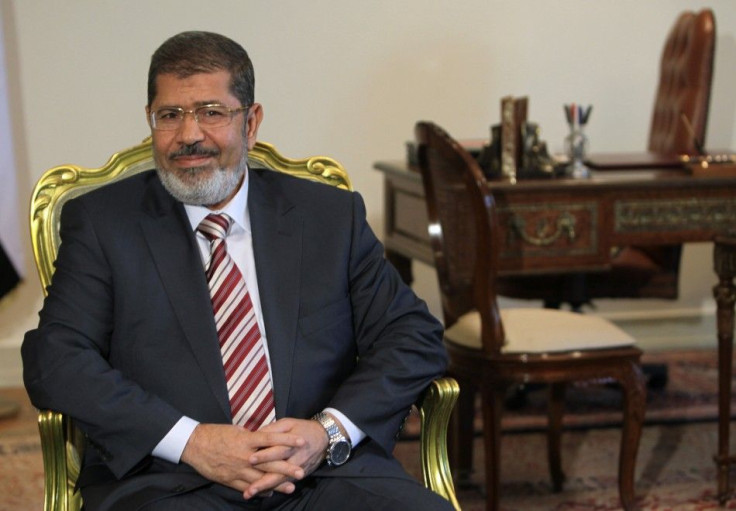NAM Summit: Has Morsi’s Iran Visit Led To Unwarranted Finger-Pointing Against Egypt?

The last time the nations participating in the Non-Aligned Movement (NAM) summit came under fire due to the host country's obvious anti-American stance was in 1979 when Cuba hosted the event. Iran, which is hosting the summit this year, has made sure that the summit, that usually doesn't generate substantial interest, is back in the limelight.
Iran, facing four rounds of U.N. Security Council sanctions over its alleged nuclear program, sees the meeting of the 120-member-nation alliance, which doesn't formally align itself with or against any major power bloc, a "boon" to the country's international relations.
Egyptian President Mohamed Morsi is heading to Iran Thursday for a four-hour visit to attend the meet while the U.S. has made several mentions of its displeasure over the crucial visits by heads of states to Tehran owing to the standoffish atmosphere between Israel and Iran.
U.S. State Department spokesperson Victoria Nuland Tuesday said Washington had been "encouraging countries not only to downgrade their representation but if they did choose to go, to be strong in the comments that they made to Iranian leaders with regard to Iran's unfulfilled obligations, their nuclear, their human rights, their - the concerns we have about their support for terror, the concerns we have about what they're up to in Syria."
In an interview published last week, Iranian Foreign Minister Ali Akbar Salehi said Iran hoped to restore relations with Egypt which have been non-existent for the past 30 years ever since Egyptian President Anwar Sadat signed a peace deal with Israel following the 1978 Camp David Accords. Relationships were further strained in the 1980s when Egypt supported Iraq in its war against Iran.
"Egypt is the cornerstone of the region and has a special stature in the Arab and Muslim countries... and we want relations of friendship and brotherhood with it," Salehi said in the interview with Egypt's Al-Ahram newspaper.
But a brief visit by the Egyptian president is clearly not enough to restore the ties which are of crucial significance to the peace and stability in the region in general and to Israeli security in particular.
However, Morsi's participation in the meeting, signifying a precursor to a potential formidable alliance between Iran and Egypt, has indeed been unsettling for the U.S. and Israeli establishment.
"Western political circles are highlighting Iran's support for Shia currents in the region, including the emergence of Shia Crescent, to depict Tehran's policies as against regional security and the security of Egypt. They believe that Egypt belongs to the Sunni world and are, thus, putting much emphasis on political and ideological gaps between the two countries," Davoud Ahmadzadeh, faculty member at the Islamic Azad University in Tehran and expert on Egypt Issues, wrote in an article published in the Iran Review Wednesday.
Morsi's presence "will prove that the Egyptian foreign policy has undergone a major metamorphosis and the new Egypt will not easily surrender to policies of the West and some reactionary regimes in the region," Ahmadzadeh wrote.
However, Egypt's Muslim Brotherhood, which supports Morsi's Freedom and Justice Party, said it was time to create a "united Muslim front."
"The Muslim Brotherhood has sought to combat sectarianism, put the Shiite-Sunni conflict aside and create a united Muslim front - even if that includes Iran," an article published on Ikhwanweb, the Muslim Brotherhood's official website said, as reported by Egyptian newspaper al-Ahram.
"Under the influence of the tolerant Brotherhood, Egyptians are more comfortable with Shiite Islam than other Sunnis in other Arab countries," the article stated.
However, it is unlikely that Morsi, who vowed to change his pro-Hamas, anti-Zionist and anti-Copt tune to transform Egypt into a truly democratic nation, would wreck the goodwill he has been building in the region as well as in the West by tying up with Iran, pitting the nation against U.S. and its allies in the region. It's not to be forgotten that Morsi's first foreign visit after swearing in as the head of the state was to Saudi Arabia, Iran's main rival in the region.
Egypt's diplomatic line will be "more agile and active," leaving behind the "stagnation" under Mubarak's rule, Morsi's spokesman Ali had said before the president left for China en route to Iran, according to a report. "We are not in competition with any country," he said.
Perhaps, it is time to quit reading sinister subtexts in Morsi's Iran visit and for once believe that Egypt truly is looking forward to building a future which will be a lot simpler if it doesn't continue to alienate nations or stay servile to certain others.
© Copyright IBTimes 2024. All rights reserved.






















